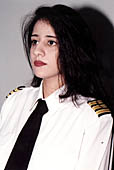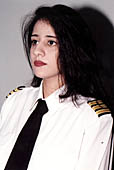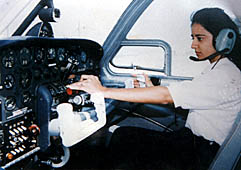
Breaking New Grounds: YEMEN’S FIRST FEMALE PILOT [Archives:1998/32/Interview]
August 10 1998
Yemeni women are slowly breaking new grounds in a man’s world. Career women are few in Yemen, and those who have managed to remain on their jobs have done so with two major constraints – a) that their careers are exclusively limited to certain sectors (teachers, nurses, medical doctors, secretaries, low-level to mid-level clerks, etc.); and b) that they are always under the protection of some consenting male guardian.

1) That women in Yemen have been working since time immemorial – on the farms and at home – although they are not paid for it.
2) More and more men are willing to accept women as equal colleagues;
3) The international community is supporting the liberalization of women.
Today, Yemen has its first female pilot. She is Ms. Rosa Mustafa Abdulkhaleq. Rosa, 26, finished her secondary-school studies in Aden and went to train to be a civil aviation pilot at the Delta Aeronautics Institute in Texas, USA. She has been working for seven years with Yemen Airlines. Now, she is ready to fly.
Rosa acquired 5 different types of certificates:
– First solo,
– Private pilot,
– Instrument certificate,
– Commercial pilot, and
– Single and multi-engine.
Dr. Selah Haddash, Managing Editor of Yemen Times, spoke to Ms. Abdulkhaleq and filed the excerpts below.

A: Some people think it is difficult for Yemeni women to be pilots, it is not. The assumption arose because men have made this field their exclusive realm.
In the past, everything was considered difficult or taboo for Yemeni women. They couldn’t be lawyers, doctors, etc. This was not only in Yemen but also in other countries.
So it was quite a challenge for me to overcome such obstacles and open this wonderful field. Yes, it is now open for women!
Q: Why did you choose this profession in particular?
A: To become a pilot and enjoy the freedom of flying was my dream since early in my childhood. Some children like animals, cars, toys, dolls, or other toys. And some like birds or airplanes. I was one of those.
As an adult, I thought of studying computer science due to its power in this modern age. But my real passion lay in flying. I went on to study aeronautics because I love birds very much.
Q: Were you at any time put off by the possible risks involved in aviation?
A: There are risks and hazards in all profession, and everywhere you go. Even crossing the street involves a certain amount of risk. But flying is not really a very risky business.
What is more important, however, is to remain fit. Pilots, for example, have to do medical checkups every six months. Other crew members have to have check-ups every year. In case any one of them has any heart, sight or hearing problems, he or she has to be transferred to ground work. A number of other safety measures also have to be taken by all pilots and cabin crew.
Q: How many flight hours did have to have before qualifying as a pilot?
A: I qualified after 258 hours of flying. There are other types of certificates that are based on a smaller number of flying hours. Many international airlines require a minimum of 190 hours. But I did 258 just to acquire more experience.
I stayed in the US for ten months, seven and a half months of which were exclusively for training.
Q: What problems did you face in America with regard to your study and social life?
A: I did not face any difficulties to speak of with regard to language and studying. Differences in social customs and traditions may have presented some problems. However, generally speaking, life in America is easy and not complicated at all. I was very determined to continue my training which is the sole goal that took me to America in the first place. I had to fit in with my studying/training environment more than in the vastly different social life.
Due to the generally cold weather in winter, I found difficulty in flying daily. The time specified to flying with my instructor was two hours per day. So, because of the winter weather, I felt that I did not practice enough. Though difficult in the beginning, with practice it became easier and more interesting.
Q: Do you think that Yemeni females can live away from their families while studying or even working abroad?
A: I believe that some people are strangers in their own country. I did not find any problem when I went to America. I was expecting some trials and tribulations because of differences in tradition and religion. I actually discussed this matter with my family and relatives before leaving Yemen. Since some of them traveled a lot, I got some good advice and suggestions.
I believe a person – male or female – can create his/her little world within the boundaries that he/she determines. This is possible in the USA.
Q: What was your family’s first reaction to your wanting to study in America?
A: I did not find any objection. My father and mother are well educated and know that studying is very important for my future. Actually, they encouraged me.
Q: Where are you working now?
A: I was provisionally appointed at Yemenia Airlines in November, 1997. But due to long-winded bureaucratic procedures, the appointment was not officially completed until March of this year. However, I had actually started flight operations training in January.
I am now a pilot under training. I am in a long list of fellow graduates who have been training for about five years. Current work requirements and vacancies do not demand a large number of pilots. Also Yemenia is having some difficulty in training new pilots. For example, there is no flight simulator in Yemen. The normal training period is around three to six months.
I am allowed to attend a refresher course, but I need an initial course which has not started yet. To do an initial course abroad, a pilot needs about 20 to 40 hours at $450 to $500 an hour.
Q: Where you easily accepted by Yemenia?
A: I was appointed immediately by the Director of Operations, Captain Abdulkhaleq Al-Qadhi. Moreover, I feel grateful for the interst and support of the President of the Republic.
Unfortunately, a year has passed and I am still on the waiting list, despite the fact that I am the first female pilot in Yemen and the Arabian Peninsula.
Q: How have your male colleagues reacted to having a Yemeni female pilot working with them?
A: Outwardly, everybody congratulates me on my achievement and encourages me to do more. Maybe very few of my colleagues think that I am getting more attention than I deserve. As the first female pilot, I draw attention, which is normal. But I am not letting that go to my head. I still ask and consult with my older and more experienced pilot colleagues, even if they are still trainees like myself.
Q: Many Yemeni men refrain from marrying educated or professional women. Which would you choose marriage or your career?
A: My decision to become a pilot was out of a real passion and ambition to excel in this profession. Marriage should be based on mutual understanding. I do not see them nutually exclusive.
My future husband should respect my ambition and hopes. He should not try to hinder my professional career. Likewise for him. It is an equal partnership.
Q: What are your hobbies?
A: I like to read poetry.
Q: Any last comment?
A: I faced some unforeseen difficulties in being a professional aviatrix. I think any females wishing to become pilots will find easier from now on. Many female friends and acquaintances visited me wanting to know what it is like to be a pilot. Many of them have had a hidden desire along the same path.
A colleague pilot told me that his daughter wants to become a pilot, but he advised her to wait and see how I’ll fare. I think many people still think that aviation is too dangerous a profession for women.
——
[archive-e:32-v:1998-y:1998-d:1998-08-10-p:./1998/iss32/intrview.htm]


